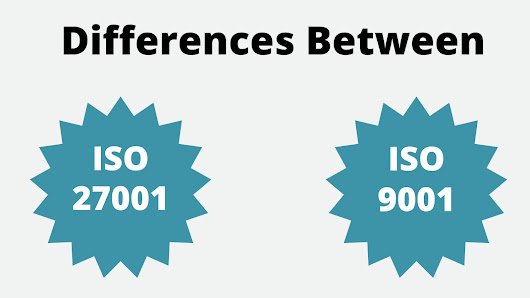Differences between ISO 27001 and ISO 9001
ISO 27001/9001 certifications are not only a source of pride, but they also demonstrate a considerable difference in the level of service offered when compared to uncertified firms. They offer the finest experience and best practices for all of us, both current and prospective clients. We'll look at how 9001 and 27001 certifications effect how your organization runs in this post. Furthermore, the advantages that clients may gain by adopting the services of ISO-certified IT organizations. Any IT organization can obtain 9001 or 27001 certifications, although it is not needed. Differences in the reasons for receiving a certificate may also exist. In certain circumstances, the main goal is to employ the best procedure feasible. IT organizations may seek to ensure their clients that they are adhering to the 9001 or 27001 standards. Despite differences in probable reasons, attempts by firms throughout the world to gain certification have increased in recent years. According to an International Organization for Standardization study conducted in 2016, the overall number of accredited firms grew by 8%. This equates to 123,989 fresh certifications issued in the last year. Of course, the objective of an organization's certification is debatable
ISO 9001 (Quality Management System):
The primary goal of ISO 9001 certification is to verify that quality processes are followed and that the organization maintains the appropriate level of product quality. It is founded on ideas such as strong customer focus, enhanced management dynamics, and continual development and approach. The 9001 standard's main concept is to guarantee that customer demands are satisfied and that there is adequate opportunity to enhance customer satisfaction. The consumer is protected via authentication. The certificate demonstrates that you are serious about your demands and requirements according to the recognized management standards.
ISO 27001: Management system for information security
The primary goal of ISO certification is to create criteria for the implementation and continual development of information security management systems (ISMS). The standard has 35 security categories, such as Access control, physical and environmental protection, privacy and information protection, and so on. Furthermore, there are 114 controls. The basic concept is to develop and maintain settings that support the security of sensitive information such as company data and employee personal data. They have an impact not just on people, but also on IT processes and systems.
The Advantages of ISO 27001 Certification
1.
It safeguards your reputation against
security threats: The most apparent purpose for ISO 27001 certification is
to aid in the prevention of security risks. This covers cybercriminals who have
infiltrated your business as well as data breaches caused by internal errors.
2.
You avoid fines: ISO 27001 assists firms
in avoiding costly penalties related with data protection obligations such as
the GDPR (General Data Protection Regulation).
3. This decreases the frequency with which audits are required: ISO 27001 accreditation is globally recognized and proves excellent security, removing the need for frequent customer audits.
The advantages of ISO 9001 certification for business
1. Increased chances of winning a contract: ISO
9001 accreditation enables businesses to collaborate with both the public and
private sectors. For public-sector bids, ISO 9001 accreditation is a
significant indicator that a firm is well-run and reputable, removing the need
for considerable due investigation. Similarly, many private organizations seek
ISO 9001 certification from their suppliers.
2. Increased client satisfaction: Tracking
customer satisfaction and addressing any concerns that emerge is one of the
most critical parts of the ISO 9001 standard. Companies who seek and retain ISO
9001 accreditation demonstrate that they are concerned about this issue.
3. Improving product or service quality: Companies
that have achieved ISO 9001 certification are prepared to deal with
unanticipated occurrences. For example, if a product fails to satisfy the
criteria, a process is put in place to successfully handle the problem and keep
it from happening again.
4.
Improved management: Proper analysis and
reporting are critical components of successful corporate operations. The ISO
9001 standard assists firms in doing so correctly.
5. Increasing employee happiness and job
security: Employees are happy and comforted by their job at a firm where
the process is well defined and managed.
6. Low price: Lowering premiums may result from obtaining and keeping ISO 9001 certification. This is because insurers are aware that they are employing adequate risk-mitigation methods and controls.
Let us now examine if there is a significant difference
between certified and non-certified organizations.
Apply Online ISO certification in Lucknow
What is the distinction between ISO certified and
non-certified businesses?
Everyone is aware that obtaining a 9001 or 27001
accreditation for an IT organization may be a time-consuming and laborious
process. What is the distinction between an ISO-certified IT firm and a
non-certified IT firm? There is a significant disparity between how things are
done and how they should be done in accordance with the 9001 and 27001
standards. Everything is ready, as it usually is. It is changeable and may be
improved. IT organizations must employ approaches to detect information
security threats and more in order to comply with ISO 27001. Learn how
compliance may help IT businesses enhance their meetings.
What the customer wants. Let's look at the 9001 and 27001
standards in more detail. A good awareness of the distinctions between 9001 and
27001 will assist you in determining whether the quality of service supplied by
your IT firm is sufficient to fulfil your requirements and the superior
elegance of a certain product. Cases have excellent priorities. This standard
is used by both 9001 and 27001 to set particular organizational standards that
help standardize products and services in order to offer more business
possibilities and better fulfil consumer expectations.
Also Read Process of ISO certification in Patna


Comments
Post a Comment